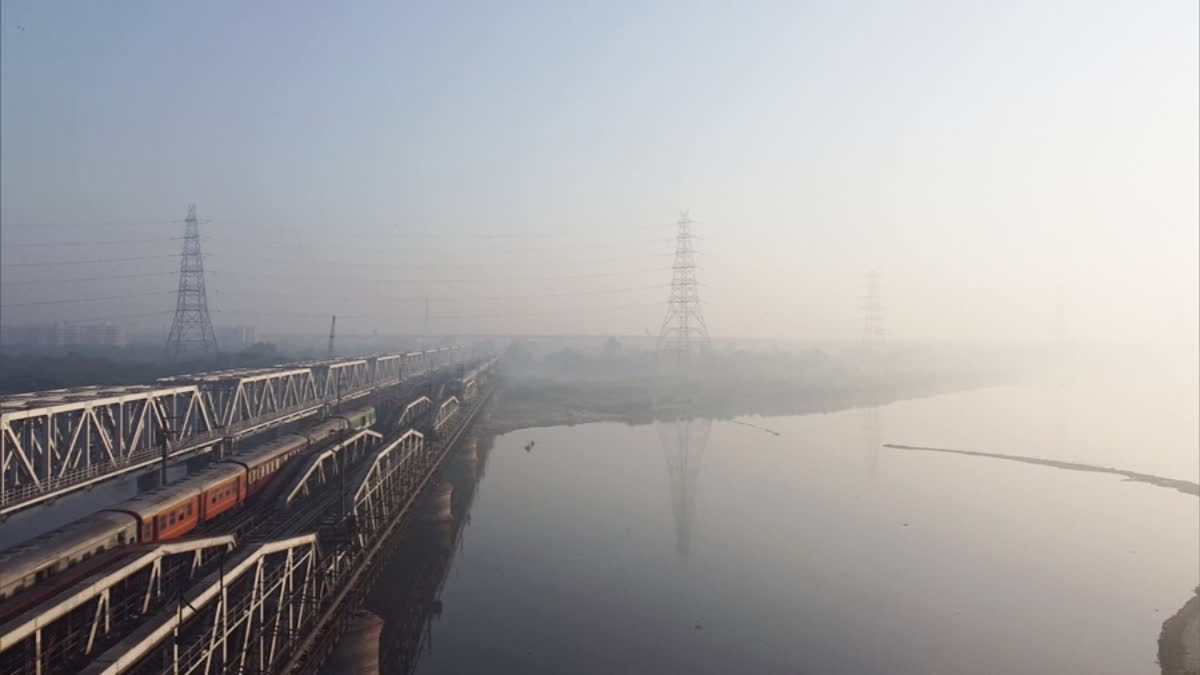New Delhi: Delhi’s air quality index (AQI) remained in the ‘poor’ category for the second consecutive day in December, recording 272 on Tuesday. Tourists visiting the national capital reported health issues and expressed concerns about the city’s environmental conditions.
Tourists Share Experiences Amid Pollution: Milind Vaidya, Secretary of the Central Hindu Military Education Society in Nashik, Maharashtra, shared his thoughts with ETV Bharat during a stopover in Delhi, “We have come to Delhi from Kashmir and are headed to Pantnagar. Upon arriving here, we immediately noticed air pollution. There’s also water and soil pollution, which gives a strange feeling. In Nashik, we ensure every person plants five trees—it’s mandatory. It’s not just about planting for show but nurturing them for nature’s benefit.”
Vaidya also highlighted the rapid increase in vehicles and the need for public transport improvements. “So many vehicles have flooded the roads. If infrastructure and individual vehicle use were controlled, it would make a huge difference. Public transport must be prioritised. Responsible citizenship is crucial for tackling pollution. If everyone contributes even a little, we can secure a better future for the next generation.”
Another tourist, Jyoti from Maharashtra, described her health struggles upon entering Delhi. “The environment in Maharashtra is very clean. As soon as I entered Delhi, I started experiencing breathing difficulties, and my eyes began to blur. It’s alarming to think about what we are leaving for the next generation. If everyone makes small contributions, significant changes can be achieved.”
She also added saying that as a citizen of India, she feels terrible imagining what foreign visitors must think about the polluted environment. "It’s disheartening,” she sighed.
Weather Conditions on Tuesday: Despite the poor air quality, Delhiites experienced sunny weather on Tuesday. The India Meteorological Department (IMD) reported a maximum temperature of 27.4 degrees Celsius, 2.1 degrees above normal, and a minimum temperature of 10.4 degrees Celsius, slightly above the seasonal average.
Humidity levels ranged from 89 per cent in the morning to 61 per cent in the afternoon, with clear skies during the day. A shallow fog was predicted for the evening and night. The IMD forecast suggests similar weather conditions for the coming days, with maximum and minimum temperatures expected to hover around 27 and 11 degrees Celsius, respectively.
Air Quality Trends and Responses: While the AQI slightly improved from Sunday’s 285, it remained within the ‘poor’ range. Since October 30, Delhi’s air quality had consistently fallen into the ‘very poor’ and ‘severe’ categories until a brief respite on Sunday when the AQI dropped below 300 for the first time in 32 days.
Of Delhi’s 38 air quality monitoring stations, 12 recorded ‘very poor’ air quality on Monday, 25 reported ‘poor,’ and one station reported ‘satisfactory’ levels, according to the Sameer app.
The Central Pollution Control Board (CPCB) classifies AQI as follows:
• 0–50: Good
• 51–100: Satisfactory
• 101–200: Moderate
• 201–300: Poor
• 301–400: Very Poor
• Above 400: Severe
Supreme Court and GRAP Measures: The Supreme Court, on Monday, refused to relax emergency measures under Stage 4 of the Graded Response Action Plan (GRAP) until a sustained downward trend in AQI is observed. The court directed chief secretaries from Delhi, Haryana, Uttar Pradesh, and Rajasthan to appear via video conference on December 5 to address concerns, including compensation for construction workers affected by pollution-related restrictions.
Urgent Need for Action: The experiences shared by tourists like Milind and Jyoti underscore the pressing need for collective action to combat pollution in Delhi.
While the weather offers temporary relief, the city’s environmental challenges require long-term solutions, including improved public transport, stricter waste management, and widespread afforestation. As the AQI continues to fluctuate, Delhiites and visitors alike hope for immediate and sustained efforts to address the capital’s air quality crisis.
Read More:



